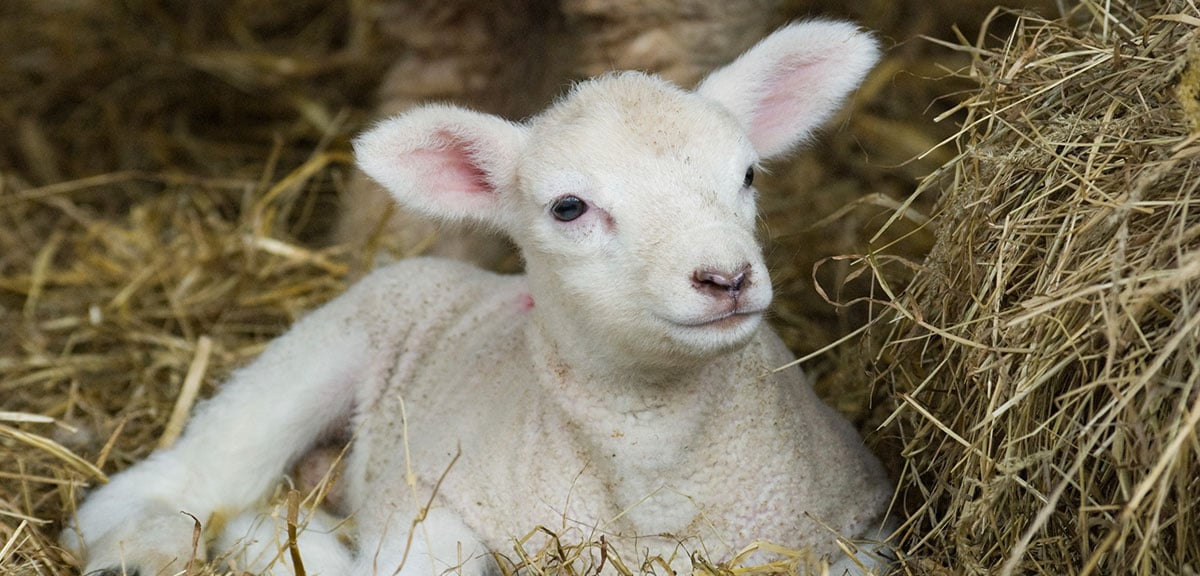
The overarching message of the Scripture is that creation is good, that it is God’s, and that God will bring about the reconciliation of the whole of creation.
When we read the Scripture through a lens of compassion to animals, here’s what we see. Get out your Bible and read along with us. Remember that verses shouldn’t be plucked from their context and that each of these examples is just one part of an overall story of redemption.
In the Beginning
God created everything. God created animals and humans and called it all very good. God prescribed a vegan diet for humans and animals alike (Genesis 1:29-30).
God created humans in God’s image and according to God’s likeness and told humans to steward this new creation. And what is God’s likeness? Throughout the Scripture, God shows us mercy that we do not deserve, grace that we have not earned, and love that we cannot imagine. We are made in that likeness and are charged with reflecting those qualities to the whole of creation. Being made in the image of God is a call to caretaking, compassion, and mercy.
Brokenness, Pain, and Fear
Human arrogance and greed quickly damage the connection between God and creation. God acknowledges the new, human-created reality in Genesis 9: “The fear and dread of you shall rest on every animal of the earth, and on every bird of the air, on everything that creeps on the ground, and on all the fish of the sea ….” Creation has been damaged, blood is being shed, and instead of coexisting in the peaceful partnership that God designed, humans now terrorize animals and one another.
As a concession to this broken reality and to mitigate suffering, God sets out strict parameters for the human use of animals. We are reminded over and over again that the Earth is the Lord’s and that we are temporary caretakers.
- People were instructed to rest every seven days in order that animals used for labor could also rest (Exodus 23:12).
- Many, many species of animals were not to be killed for food (Leviticus 11).
- Killing animals without offering thanks to God was a sin (Leviticus 17:3-7).
- Psalm 50:10: “For every wild animal of the forest is mine, the cattle on a thousand hills. I know all the birds of the air, and all that moves in the field is mine.”
- A righteous person was said to be mindful of the needs of animals (Proverbs 12:10).
For more about how sacrifices in the Hebrew Scriptures relate to Christian protection of animals, check out the FAQs.
All Creatures Worship God
The wisdom books repeatedly remind us that the whole of creation is God’s, the whole of creation worships Him, and that His covenant is with every creature. Humans and animals alike share breath, rely on God, and long to worship their Creator.
- Psalm 104 describes God’s provision for the whole of creation, and the psalmist acknowledges that all creatures respond to God: “O Lord, how manifold are your works! In wisdom you have made them all; the earth is full of your creatures. … These all look to you. … When you hide your face, they are dismayed ….”
- “Praise the Lord from the earth, you sea monsters and all deeps, fire and hail, snow and frost, stormy wind fulfilling his command! … Wild animals and all cattle, creeping things and flying birds! … Let them praise the name of the Lord, for his name alone is exalted; his glory is above earth and heaven.” (Psalm 148:7-13)
- “Let everything that breathes praise the Lord! Praise the Lord!” (Psalm 150:6)
- “For the fate of humans and the fate of animals is the same; as one dies, so dies the other. They all have the same breath, and humans have no advantage over the animals; for all is vanity.” (Ecclesiastes 3:19).
A Vision of Reconciliation
The prophets speak loudly and often of a world whose inhabitants are reconciled to God and to each other:
- God does not want the blood of animal sacrifices (Isaiah 1:11), and the murder of an ox and a human are equally despicable (Isaiah 66:3).
- God will call all creatures to safety, from flies and bees to sheep and cows (Isaiah 7:18-25), and they will all worship their Creator (Isaiah 43:20).
- The vision for a reconciled future is a peaceful kingdom in which the wolf lies down with the lamb, and a child leads them. Hurt and destruction will pass away (Isaiah 11:3-9 and 65:25).
- Ezekiel 29:3-5 foretells the consequences of treating creation as if it existed solely for human benefit: “I will put hooks in your jaws … I will fling you into the wilderness … To the animals of the earth and to the birds of the air I have given you as food.”
- God’s covenant is with all of creation: “I will make for you a covenant on that day with the wild animals, the birds of the air, and the creeping things of the ground; and I will abolish the bow, the sword, and war from the land; and I will make you lie down in safety.” (Hosea 2:18)
New Life in Christ
Christians are called to be radically inclusive in their love for the least and most marginalized of society, as demonstrated by the life and death of Christ. Jesus was friends with sinners, tax collectors, prostitutes, and outcasts. He touched the untouchable and offered mercy to all.
Jesus was God incarnate, enfleshed. Jesus brought the reign of God into human history and extended an invitation for the whole of creation to participate in a new kind of Kingdom. The Kingdom of God is countercultural and offers liberation from sin, death, and oppression.
As the body of Christ, we are called to be prophetic. The Scriptures make it clear that we look forward to a fully reconciled creation, free of killing and destruction. Our challenge, therefore, is to look at what’s happening in our world today, at how we are contributing to brokenness, and change that. In the past, the church has struggled for the abolition of slavery, suffrage and basic rights for women and children, and more. One hundred to 200 years from now, the church should look back and be proud to have been the leader in animal protection.
Everything about using animals for food, for clothing, for experiments, and as “entertainment” flies in the face of what it means to be a good steward of God’s creation. All animals are individuals with feelings—they feel pleasure, loneliness, and fear, yet they are subjected to horrific abuse at human hands.
